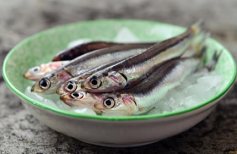Good hand washing is the first line of defense against the spread of many illnesses — from the common cold to more serious infections, such as meningitis, bronchitis, the flu, hepatitis A, and most types of infectious diarrhea.
To minimize the germs passed around your family, make regular hand washing a rule for everyone, especially:
- before eating and cooking
- after using the bathroom
- after cleaning around the house
- after touching animals, including family pets
- before and after visiting or taking care of any sick friends or relatives
- after blowing one’s nose, coughing, or sneezing
- after being outside (playing, gardening, walking the dog, etc.)
The few seconds you spend at the sink could save you trips to the doctor’s office.



 filled with omega-3 fatty acids and vitamins such as D and B2 (riboflavin), rich in calcium and phosphorus and a great source of minerals, such as iron, zinc, iodine, magnesium, and potassium.
filled with omega-3 fatty acids and vitamins such as D and B2 (riboflavin), rich in calcium and phosphorus and a great source of minerals, such as iron, zinc, iodine, magnesium, and potassium.


